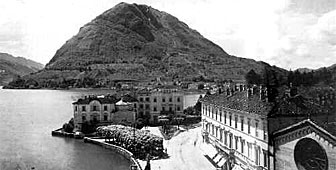Marco Solari: the joviality of Ticino – a myth created for tourists

Marco Solari, who was last year named president of the Locarno film festival, rose to national prominence as the man behind the 700th anniversary festivities celebrated by the Swiss confederation in 1991.
Solari lives and works partly in canton Ticino and partly in Zurich, where he is second-in-command at the Swiss media concern, Ringier. He was born in Bern, and was for a time head of the Ticino tourism authority.
“According to a survey, the inhabitants of cantons Graubünden and Ticino are among the most amiable people in Switzerland. I don’t set much store by surveys of this kind, largely because I know a number of fellow-Ticinese who are not at all likeable, and many people in Zurich, who are very friendly indeed – and they are ranked last in this table.
A survey of this kind is probably highlighted for economic and tourist reasons because it reaffirms the myth of a “jovial people”. That’s an idea which is rejected locally, although foreign visitors love it.
The idea reflects the nostalgia that people from the north have for a southern land of warmth and sunshine, which they regard as synonymous with freedom, a place to let their hair down and cast off the conventions and restrictions which society imposes. And so it is that the people of Ticino – the first “southern” area you come to after crossing the Alps – are still expected to conform to this image: jovial and carefree – somewhat like childlike adults.
The Ticinese, according to this prejudiced line of thinking, are characterised by their superficiality, unreliability, and possibly even aversion to work. But, when all is said and done, “the Ticinese are good Swiss”. These unpleasantly patronising views hark back to schoolbook ideas perpetuated during my childhood in German-speaking Switzerland.
What then is the real character of the Ticinese? I believe we are above all the product of our history – a history tragically marked by poverty, hunger and emigration. We have been shaped by centuries of struggle against the area’s mountainous terrain and through our resistance to the illnesses which prevailed in our marshy lakeside villages.
For 300 years the valleys of Ticino were subject regions of the old confederation, and life there was characterised by terrible poverty. In 1794 – in other words, in very recent times – after travelling in the Verzasca Valley, the Bernese patriot Karl Viktor von Bonstetten wrote that “no German-Swiss pig would be prepared to live in these miserable huts”. Cruel words, which are still painful today.
Napoleon conquered the old confederation, but liberated Ticino. This was followed in the 19th century by political enthusiasm and support for the Italian Risorgimento (the movement for Italian independence and national unity), but also by indescribable economic difficulties and famines, which forced many people to emigrate, sometimes to other continents.
Nowadays, thanks to the coming of the railways and the St Gotthard tunnel, the region has come to enjoy a degree of material well-being; for this, however, it has had to pay the high cultural price of adapting its image to the requirements of tourism.
Today, after many decades, Ticino at last seems to have become more self-confident. Despite the proximity of Lombardy (northern Italy), it is no longer obliged to submit to anyone and, thanks to its economic and cultural activities, it has also gained greater political importance.
Switzerland needs to take care of Ticino because, as the third main component of our country, it can prevent the latent conflict between the German-speaking majority and the francophone minority from worsening.
I have great faith in my Lombardic canton and its extraordinary cultural and political potential.”
Marco Solari

In compliance with the JTI standards
More: SWI swissinfo.ch certified by the Journalism Trust Initiative
You can find an overview of ongoing debates with our journalists here . Please join us!
If you want to start a conversation about a topic raised in this article or want to report factual errors, email us at english@swissinfo.ch.